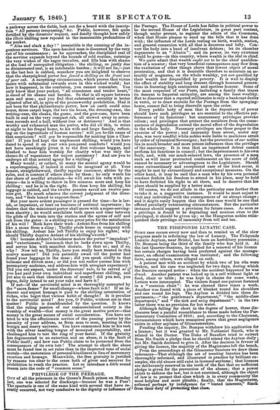THE FISHPONDS LUNATIC CASE.
SOME case occurs every now and then to remind us of the slow progress made in reforming the law of Lunacy. The Fishponds Lunatic Asylum, near Bristol, has been an hereditary possession ; Dr. Bompas being the third of the family who has held it. At the last Quarter-Sessions, he applied for a renewal of his licence but certain charges having been preferred against the manage- ment, an official examination was instituted; and the following facts, among others, were alleged on oath.
A patient met with an accident by which two of his ribs were broken, and his case was neglected for two days, during which the fracture escaped notice : when the accident happened he was drunk. Another patient was locked up in a cell without light or food, chair or table ; he was kept in chains for some weeks. Letters were intercepted. The visiters found one patient fastened in a "coercion chair ": he was cleaned three times a week. Another was found with a piece of blanket round his shoulders and one round his legs. The Asylum is divided into three de- partments,—" the gentleman's department," "the middle-class department," and "the sick and noisy department": in the two latter there was no provision for hot water. Although falling far short in the degree of horror, these dis- closures bear a painful resemblance to those made before the Par- liamentary Committee of 1816; and, according to the Chairman, circumstances which have transpired prove that great negligence exists in other asylums of Gloucestershire. Pending the inquiry, Dr. Bompas withdrew his application for a licence ; but it was granted to Mr. Nathaniel Smith, who is related to the Doctor. The Duke of Beaufort tried to extract from Mr. Smith a pledge that he should attend the Asylum daily• but Mr. Smith declined to give it. After the decision in favour of giving the licence, the majority of the Magistrates left the bench. From the proceedings at the Gloucester Sessions we draw these
inferences—That although the art of treating lunatics has been thoroughly reformed, and illustrated in practice by brilliant ex- amples, the old abuses still exist in licensed asylums; that licences are deliberately renewed in the teeth of the fact that no sufficient pledge is given for the prevention of the abuses; that a power exists to enforce the law, but is not exercised, although the object of law is to protect that ciass which is in every community the most helpless and most pitiable; finally, that the Magistrates, softened perhaps by indulgence for "vested interests," flinch from their duty of protecting that clam






























 Previous page
Previous page